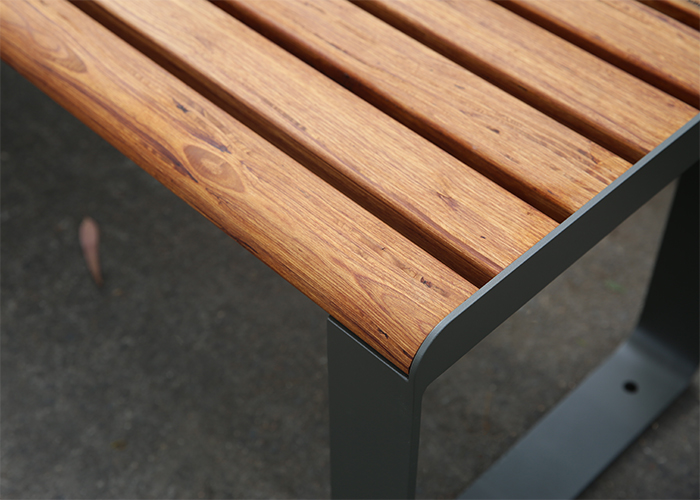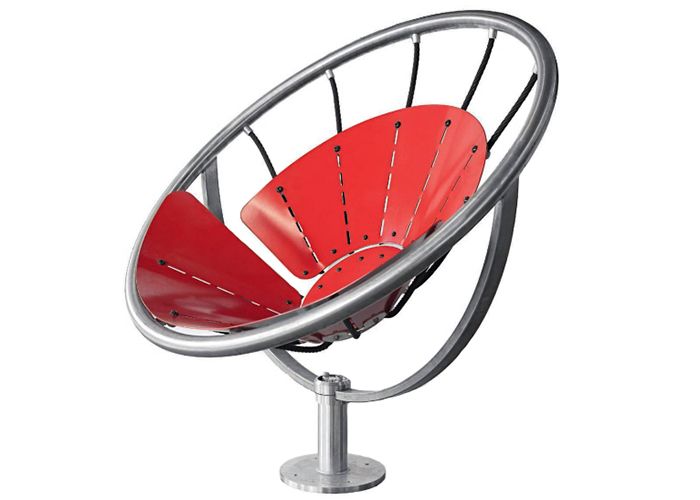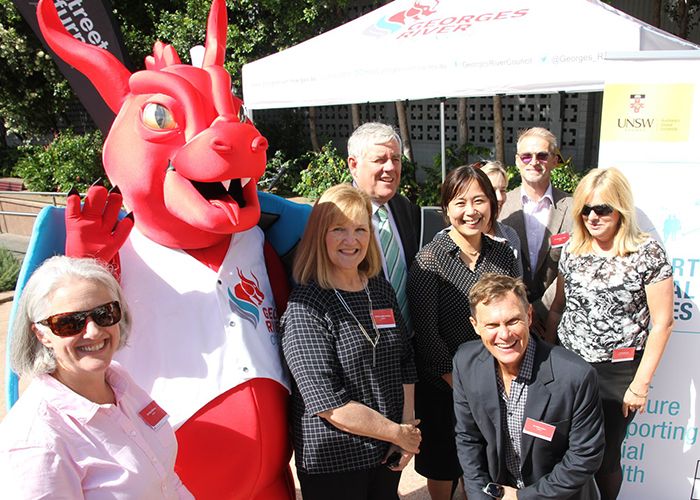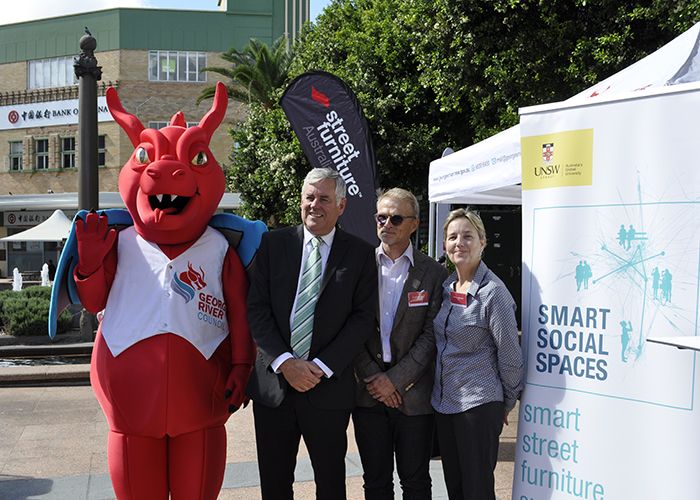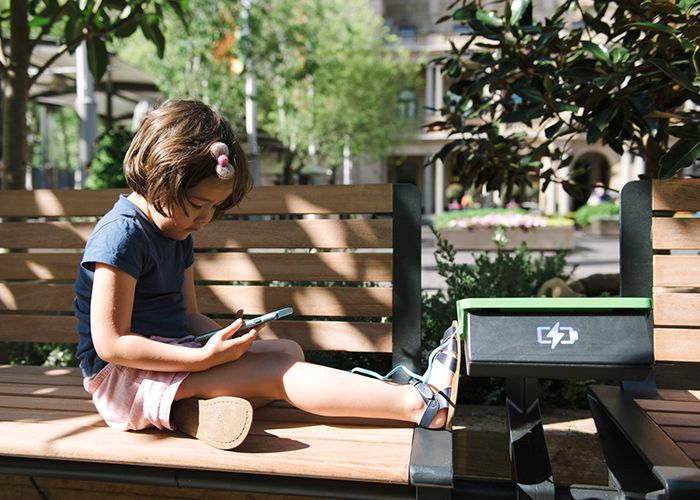
Street Furniture Australia’s new Aria Smart Bench with PowerMe™ Table is featured in The Wall Street Journal as part of an article on the Smart Social Spaces project.
Georges River Council with the University of New South Wales (UNSW) will investigate how data collected by smart furniture and sensors can be used for urban management and the local community.
New furniture including Aria and PowerMe has been installed at two locations in Georges River: a plaza, Memorial Square in Hurstville, and two sites in a suburban green space, Olds Park in Penshurst.
UNSW will collect the data and work with Georges River Council on responsive asset management. Street Furniture Australia is the industry partner for this project.
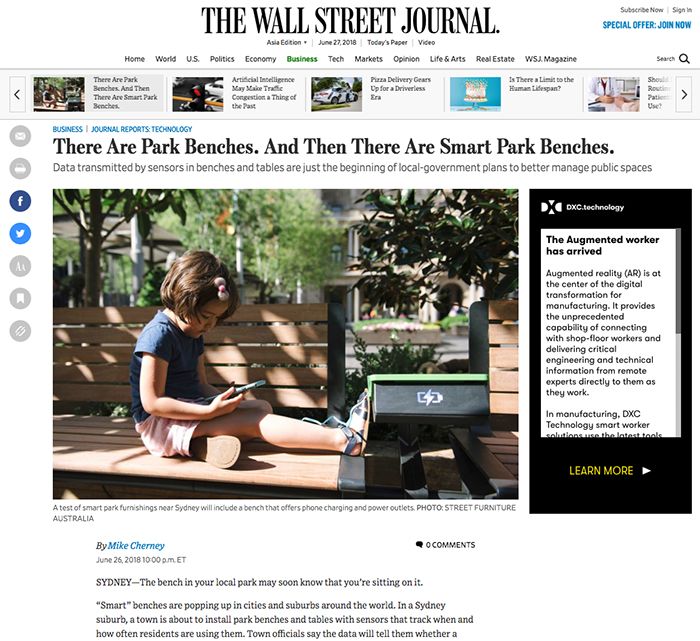
Excerpt from the article, by Mike Cherney:
SYDNEY—The bench in your local park may soon know that you’re sitting on it.
“Smart” benches are popping up in cities and suburbs around the world. In a Sydney suburb, a town is about to install park benches and tables with sensors that track when and how often residents are using them. Town officials say the data will tell them whether a bench or table isn’t being used, or is broken, thus helping them redesign public spaces and speed up repairs.
The nearly $500,000 trial, funded in part by an Australian government grant, is one of many projects in different countries deploying smart furniture in parks and public spaces. A U.S.-based company, Changing Environments Inc., offers a solar-powered bench that comes with phone chargers and sensors that measure nearby activity. A British company, Strawberry Energy, has installed similar benches around London.
Future cities will use sensors on everything from parking spaces to water meters to “crunch numbers on big items like utility consumption, traffic, public transport, power use,” says Christian Tietz, senior lecturer in industrial design at the University of New South Wales, and co-leader of the Sydney suburb trial. “We don’t want to look at the big stuff. We want to look at microenvironments.”
In the past, to measure how many people use a particular area of a park, officials have typically relied on surveys or dispatched observers—methods that are time-consuming and expensive. In contrast, the sensors will use mobile networks to automatically send data to park managers in real time.
The Sydney suburb’s local government, the Georges River Council, will test two types of sensors supplied by a private company, Street Furniture Australia: One type of sensor will count foot traffic using Wi-Fi to determine how many devices are in the area; the other will measure vibrations on a bench caused when someone sits on it or moves it.
Both methods have their advantages. Counting devices in an area will miss children or anyone else not carrying a smartphone or tablet. But the vibration sensor, affixed under a bench, will register not just if someone sits on it but also if a heavy bag is set down on it. Researchers plan to gather data for six months.
Other items in the trial include internet-connected trash bins, which will signal when they are full and if there is a fire inside, and a bench and table that will include phone-charging and power outlets.
“It’s about making public spaces more enjoyable for people and communities,” says June Lee Boxsell, design and marketing manager at Street Furniture Australia. “You could have an outdoor meeting room where business people come out of their offices and have a chat,” she says.
Kevin Greene, mayor of the municipality, says the local government has a general idea of how many people use its public spaces, but it’s “based on anecdotal evidence rather than good statistical data.” Mr. Greene says he would like to use the technology in other public areas when this trial is complete.
He says the data collected won’t identify individuals, just raw numbers, so residents shouldn’t be concerned about privacy.
“It doesn’t matter if it’s me, you or Billy Bob sitting on the seat,” he says. “There’s no private details involved in this.”
You can also read an ABC Radio Drive interview transcript between Richard Glover, Georges River Council Mayor Kevin Greene and UNSW’s Dr Nancy Marshall.

Keep up with the news by joining StreetChat, our monthly e-newsletter. Join our Build Aria app competition for your chance to Win a Drone!





